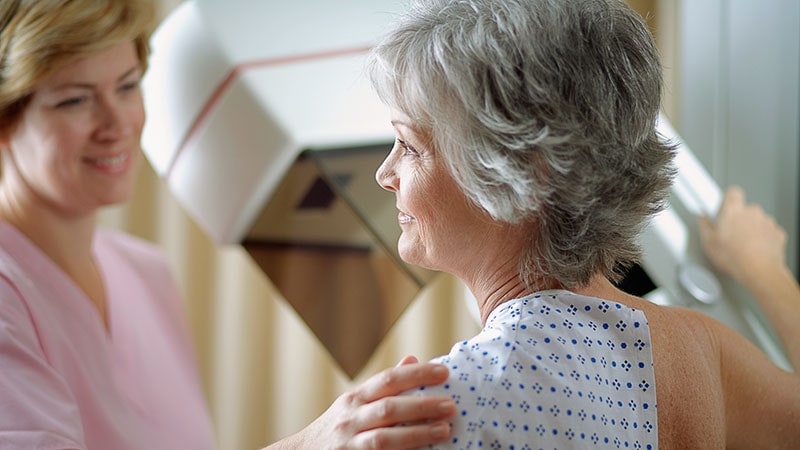Risk of Overdiagnosis in Older Women Getting Mammograms
Core Concepts
Older women undergoing mammograms face a significant risk of overdiagnosis.
Abstract
The content discusses the risk of overdiagnosis in older women who continue breast cancer screening after the age of 70. The study linked Medicare claims data with SEER data to compare breast cancer incidence and death rates among women who continued screening mammography versus those who did not. Overdiagnosis was defined as the difference in cumulative breast cancer incidence between screened and unscreened women. Results showed no significant reduction in breast cancer-specific death associated with screening, with overdiagnosis being more prevalent in in situ and localized invasive breast cancer cases. Patient preferences and risk tolerance are crucial in informing screening decisions for older women.
TOPLINE:
Older women continuing breast cancer screening after 70 face overdiagnosis risk.
METHODOLOGY:
Linked Medicare claims with SEER data for 54,635 women 70+.
Defined overdiagnosis as the difference in cumulative breast cancer incidence.
Results adjusted for age, race, and ethnicity.
TAKEAWAY:
Over 80% of women aged 70-84 and over 60% of women aged 85+ continued screening.
Estimates of overdiagnosis ranged from 31% to 54% in different age groups.
IN PRACTICE:
Patient preferences crucial in informing screening decisions for older women.
SOURCE:
Study led by Ilana Richman, MD, MHS, published in Annals of Internal Medicine.
LIMITATIONS:
Definition of screening mammography may have misclassified some diagnostic mammograms.
Results not adjusted for breast density, family history, and other risk factors.
DISCLOSURES:
Work funded by the National Cancer Institute.
Older Women Who Get Mammograms Risk Overdiagnosis
Stats
Over 80% of women 70-84 years old and more than 60% of women 85 years or older continued screening.
Estimates of overdiagnosis ranged from 31% of breast cancer cases among screened women in the 70-74 age group to 54% of cases in the 85 and older group.
Quotes
"The proportion of older women who continue to receive screening mammograms and may experience breast cancer overdiagnosis is 'considerable' and 'increases with advancing age and with decreasing life expectancy.'" - Authors
Key Insights Distilled From
by M. Alexander... at www.medscape.com 09-26-2023
https://www.medscape.com/viewarticle/996809
Deeper Inquiries
How can patient preferences be effectively incorporated into breast cancer screening decisions for older women?
Incorporating patient preferences into breast cancer screening decisions for older women involves a shared decision-making process between healthcare providers and patients. It is essential to educate patients about the benefits and potential harms of screening, including overdiagnosis, to help them make informed choices based on their values and preferences. Healthcare providers should discuss the risks and benefits of screening, consider the patient's overall health status, life expectancy, and personal values, and tailor screening recommendations accordingly. Shared decision-making tools, such as decision aids, can also help older women understand the implications of screening and make choices aligned with their preferences.
What are the potential implications of overdiagnosis in breast cancer screening for healthcare systems and resources?
Overdiagnosis in breast cancer screening can have significant implications for healthcare systems and resources. It can lead to unnecessary treatments, including surgery, radiation, and chemotherapy, which may not provide any clinical benefit to patients. This overtreatment can result in increased healthcare costs, strain on healthcare resources, and potential harm to patients due to unnecessary interventions. Moreover, overdiagnosis can contribute to patient anxiety, psychological distress, and decreased quality of life. Addressing overdiagnosis in breast cancer screening is crucial to optimizing healthcare resources, reducing unnecessary treatments, and improving patient outcomes.
How can advancements in technology improve the accuracy of breast cancer screening methods for older women?
Advancements in technology have the potential to enhance the accuracy of breast cancer screening methods for older women. Digital mammography, 3D mammography (tomosynthesis), and breast MRI are advanced imaging techniques that can improve the detection of breast cancer in older women, especially those with dense breast tissue. These technologies offer higher sensitivity and specificity compared to traditional mammography, leading to earlier detection of breast cancer and reduced false-positive results. Additionally, artificial intelligence (AI) and machine learning algorithms can assist radiologists in interpreting mammograms more accurately, reducing the risk of missed diagnoses and improving overall screening outcomes for older women. Embracing these technological advancements can help optimize breast cancer screening for older women and enhance the effectiveness of early detection efforts.
0
More on Healthcare
